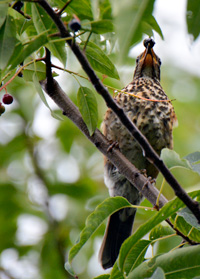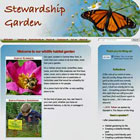 JIM D'ANGELO, JIM D'ANGELO, Executive Director of Sterling Nature Center, has presented many interesting programs on a variety of creatures through the years. This year, he'll be talking to us about
"Marvelous Mammals: Small mammals in our landscapes."
The small mammals we encounter throughout our landscape play a vital role in the larger ecosystem around us. Sometimes these mammals are maligned when they interact with our lawns and gardens. This program will help you build a better understanding and appreciation for these wonderful little creatures! We will take a look at some common small mammals like squirrels, moles, voles, chipmunks, rabbits, and mice and how they participate in the larger ecosystem. If time allows, we'll delve into some of the larger mammals like opossum, raccoon, skunk, and woodchuck. WHEN: Sunday, Feb. 22 at 2:00 pm WHERE: Liverpool Public Library ( Directions) Free and open to the public, so bring a friend or two! Janet Allen, President
|
|
Tallamy keynote at the Plant-O-Rama
|
 | | Tallamy's new book |
It was fantastic to see that "our" Doug Tallamy -- "our" because he's an Honorary Director of Wild Ones -- was the keynote speaker at the Brooklyn Botanic Garden's Plant-O-Rama this year. From the Feb. 4 NY Times article:
Plant-O-Rama has been a bellwether for trends in the garden world since its founding in 1997 ... But always, the focus has been on aesthetics: what makes an attractive garden. Last week, the keynote speaker, Douglas Tallamy, an ecologist, informed us that beauty is not enough. "We have to raise the bar on our landscapes," said Mr. Tallamy... "In the past, we have asked one thing of our gardens: that they be pretty. Now they have to support life, sequester carbon, feed pollinators and manage water."A daunting order, perhaps, but maybe it's just a shifting of gears. Yards filled with beautiful natives that can provide all of these services don't have to look unruly and formless. And they are key to survival, Mr. Tallamy argued. Pollinators, he reminded us, "pollinate 90 percent of all plants, not just crops." And if the plants crash, so do the rest of the species, including us.Read the whole article ...
|
 |
 |
Take part in the GBBC this Friday thru Monday
|

Launched in 1998 by the Cornell Lab of Ornithology and National Audubon Society, the Great Backyard Bird Count was the first online citizen-science project to collect data on wild birds and to display results in near real-time.
Since then, more than 100,000 people of all ages and walks of life have joined the four-day count each February to create an annual snapshot of the distribution and abundance of birds.
We invite you to participate! Simply tally the numbers and kinds of birds you see for at least 15 minutes on one or more days of the count, February 13-16, 2015. You can count from any location, anywhere in the world!
A great family activity and one of the easiest citizen science projects to participate in.
For more info, visit http://gbbc.birdcount.org/ .
Need help identifying birds?
Merlin, a free app from the Cornell Lab of Ornithology, is a great help. It asks you a few simple questions, then provides a photo display of the most likely birds that meet your criteria. It's remarkably accurate! Available for iOS and Android.
|
|
Milkweeds (& citizen scientists) for Monarchs
|
 | Total acres occupied by monarchs from 1994-2015 showing a very slight increase from last year's all-time low
|
Monarchs need milkweeds, so we're again offering local-ecotype milkweed plants at cost. If you're interested in swamp milkweed ( Asclepias incarnata), common milkweed ( A. syriaca) or butterfly weed ( A. tuberosa), email me with your request at hg.cny@verizon.net. We'll do our best to provide all the milkweed people can plant! And they need citizen scientists, tooAs a partner in the Monarch Joint Venture (at www.monarchjointventure.org) Wild Ones has been asked to encourage people to become monarch citizen scientists. Three projects to consider are: * tagging monarchs through Monarch Watch at http://monarchwatch.org/tagmig/index.htm* monitoring milkweeds and monarchs with the Monarch Larva Monitoring Program (MLMP) through the Univ. of Minnesota at http://mlmp.org/, and * reporting sightings at Journey North at http://www.learner.org/jnorth/tm/monarch/SpringWatch.html. Tagging doesn't start until migration season, but Journey North and the MLMP begin when milkweeds and monarchs start to appear. We're arranging training for the MLMP to take place in April or May, so stay posted for details.
|
 |
 |
|
Onondaga County Soil and Water CD plants
|
 | | A young robin enjoying some black cherries |
The annual Onondaga County Soil & Water Conservation District plant sale is underway, and these native plants are available: Balsam fir ( Abies balsamea)White cedar ( Thuja occidentalis) White pine (Pinus strobus) Black cherry ( Prunus serotina) Native birch ( Betula papyrifera) Red osier dogwood ( Cornus stolonifera) Sugar maple ( Acer saccharum)White flowering dogwood ( Cornus florida) (We don't recommend the mixed pacs or the non-native species.) Information is on the OCSWCD website; deadline for ordering is March 9.
|
|
Ithaca Native Landscape Symposium
|
 |
The 7th Annual Ithaca Native Landscaping Symposium takes place Friday March 6th and Saturday March 7th, and you can register for either day or for both. The theme is Process...and Progress?DISCOUNTS offered by the INLS:Anyone who receives this newsletter can get a flat $10 discount whether they apply it to Fri. only, Sat. only, or both days. On the registration page, there is a box labeled PROMO CODE. Enter HGCNYNEWS (all caps) to receive this discount.
And dues-paying WILD ONES members can receive a $20 discount using the promo code HGCNYMEMB (all caps).
(Note: These discounts offered by INLS cannot be combined with the INLS Early Bird offer.)
And now AN ADDITIONAL REBATE for dues-paying Wild Ones members!!In addition to the discount available as described above, HGCNY is offering an additional $25 rebate for dues-paying Wild Ones members attending one or both days of the conference. Dues-paying Wild Ones members can obtain this additional rebate from HGCNY after registering for the conference. Just email your symposium receipt to our Treasurer Randi Starmer at randi.starmer@gmail.com before March 12 (include your mailing address), and she will mail you a check for $25. Or, you may mail the rebate request to Randi Starmer, Treasurer, 8022 Bush Rd. Jamesville, NY 13089. If you would like to carpool or arrange to lunch together, send your email address to hg.cny@verizon.net and we'll put you in touch with the other HGCNY attendees to make these arrangements.
The Symposium is for landscape architects, designers, educators, Master Gardeners, government employees, homeowners, gardeners, naturalists and anyone else eager to learn more about this growing movement. Learn more and register for either or both days ...
|
 |
|
|
|
Another chance to see Tallamy presentations
|
HGCNY has donated this DVD of two Doug Tallamy presentations to the Onondaga County Public Library. If you (or your group) would like to see these presentations, just search on Tallamy in the OCPL catalog.
|
Winter Fun at Baltimore Woods
|
 Nature Adventure Day Camp Grades K-8 Nature Adventure Day Camp Grades K-8 Feb. 17-20; 9am - 4pm (Before and after daycare available.) Winter Tracking:
For Adults - Feb. 21, 10-11:30 am For Kids - Feb. 28, 10-11 am Check the Baltimore Woods website for more details about these events and others. Call (315) 673-1350 to register. |
Since HGCNY is a chapter of the national organization Wild Ones, when you become a member of Wild Ones, you're automatically a member of HGCNY, too. And since Wild Ones is an official not-for-profit, your membership is tax-deductible.
It's easy to become a member, receive the bimonthly Wild Ones Journal, and support our mission.
|
As more of us participate on our Facebook page at www.facebook.com/hgcny, this will become a useful resource for asking (and answering!) local HGCNYers' questions about habitat gardening.
|
 Visit Our Habitat Garden website for information on providing habitat, earth-friendly gardening practices, plants, and various creatures here in Central New York. |
Visit Our Edible Garden website to see an example of a local vegetable and fruit garden. An edible garden is a perfect complement to your habitat garden.
|
|
 |
|